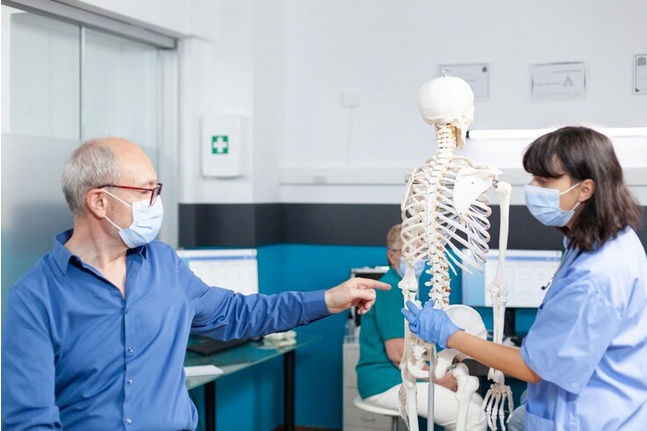The human spine, a marvel of engineering, serves as the central axis supporting our body and facilitating a myriad of movements. When spine-related issues arise, the expertise of a spine surgeon specialist becomes paramount. Beyond the vertebrae lies a complex realm of spinal health, and understanding the role of these specialists is crucial in navigating the intricate landscape of spinal care.
The Spinal Architecture: A Complex Network of Bones and Nerves
Before delving into the role of a spine surgeon specialist, it's imperative to comprehend the complexity of the spinal architecture. The spine is composed of vertebrae, discs, nerves, and supporting structures, all working in harmony to provide structural stability and facilitate movement. Any deviation from this delicate balance can lead to a range of spinal conditions, including herniated discs, spinal stenosis, and degenerative disc disease.
A spine surgeon specialist is trained to navigate this intricate network, diagnosing and treating conditions that affect the spine's functionality. Their expertise extends beyond surgical interventions, encompassing a comprehensive understanding of conservative treatments, rehabilitation, and preventive measures.
Diagnostic Prowess: Decoding the Language of the Spine
One of the primary responsibilities of a spine surgeon specialist is to decipher the language of the spine through accurate diagnosis. Modern diagnostic tools, such as X-rays, Magnetic Resonance Imaging (MRI), and Computerized Tomography (CT) scans, serve as the specialist's lens into the patient's spinal health. These imaging modalities allow for a detailed assessment of the spine's structure, identifying abnormalities, herniations, and other conditions that may be causing discomfort or impairment.
The diagnostic prowess of a spine surgeon specialist goes beyond interpreting images; it involves a comprehensive understanding of a patient's medical history, symptoms, and lifestyle factors. This holistic approach enables the specialist to formulate a personalized treatment plan tailored to the unique needs of each individual.
Conservative Management: Exploring Non-Surgical Options
Contrary to common perception, spine surgeon specialists don't solely focus on surgical interventions. In many cases, conservative management plays a pivotal role in addressing spinal issues. This may involve physical therapy, pain management, medications, and lifestyle modifications aimed at relieving symptoms and improving the overall function of the spine.
A spine surgeon specialist utilizes their expertise to guide patients through non-surgical avenues whenever possible, emphasizing the importance of a multidisciplinary approach to spinal care. This approach aligns with the principle that surgery should be considered when conservative measures have been exhausted or when the severity of the condition necessitates immediate intervention.
Surgical Expertise: Precision in Restoring Spinal Health
When surgical intervention becomes necessary, the role of a spine surgeon specialist becomes even more pronounced. Surgical procedures may range from minimally invasive techniques to more complex spinal surgeries, depending on the nature and severity of the spinal condition.
Minimally invasive spine surgery, a hallmark of modern spinal care, involves smaller incisions, reduced tissue damage, and quicker recovery times compared to traditional open surgeries. A spine surgeon specialist is adept at utilizing these advanced techniques, ensuring precision in addressing spinal issues while minimizing the impact on surrounding tissues.
Complex spinal surgeries, such as spinal fusion or decompression procedures, require a high level of surgical expertise. A spine surgeon specialist's proficiency extends to these intricate interventions, involving the fusion of vertebrae, removal of damaged discs, or correction of spinal deformities.
Postoperative Care and Rehabilitation: Nurturing the Healing Process
The responsibilities of a spine surgeon specialist extend well beyond the operating room. Postoperative care and rehabilitation are integral components of their role in ensuring the success of surgical interventions. This phase involves monitoring the patient's recovery, providing guidance on postoperative exercises, and coordinating with rehabilitation specialists to facilitate a comprehensive recovery plan.
Rehabilitation may include physical therapy to improve strength and flexibility, pain management strategies, and ongoing monitoring of the patient's progress. A spine surgeon specialist's commitment to the entire continuum of care underscores their dedication to fostering optimal spinal health and functionality.
Conclusion: Guardians of Spinal Well-Being
In conclusion, understanding the role of a spine surgeon specialist goes beyond acknowledging their surgical skills. These professionals are guardians of spinal well-being, possessing a multifaceted skill set that encompasses accurate diagnosis, conservative management, surgical expertise, and postoperative care. As the custodians of spinal health, spine surgeon specialists play a pivotal role in guiding individuals through the complexities of spinal conditions, offering personalized care that extends far beyond the vertebrae. Their commitment to advancing both surgical and non-surgical avenues underscores their dedication to the overall well-being of individuals grappling with spinal issues.


No comments yet